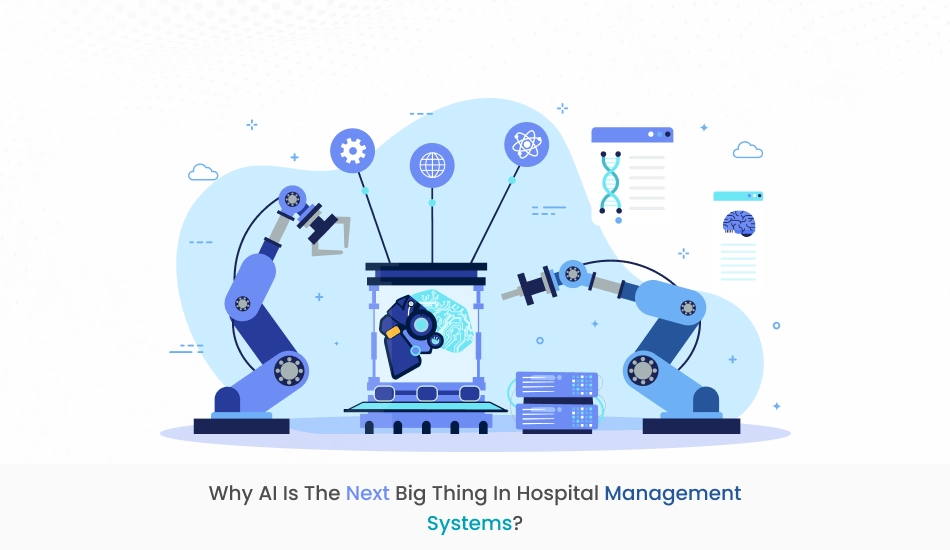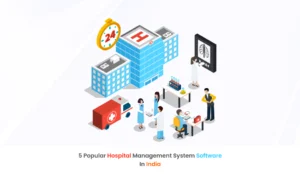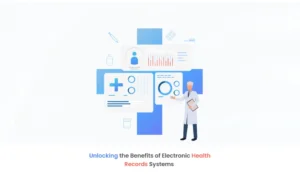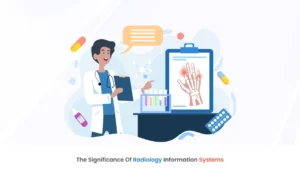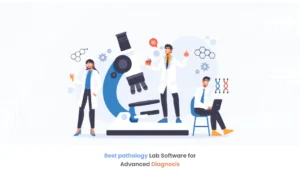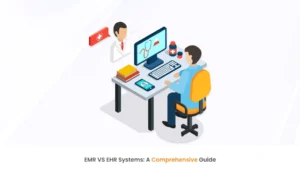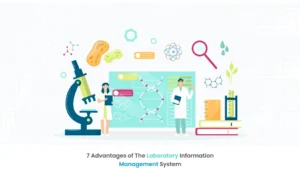Quick Summary
Artificial intelligence levels up your healthcare services and drives innovation in the hospital system from attending patients to medical billing. Take your first step and create a footpath to advance your hospital infrastructure and support better healthcare management. AI in hospital management systems has vast potential that can’t be measured in traditional healthcare ecosystems. Fostering a medical collaborative tool for centralizing healthcare specialists at a single platform, enhancing patient care, and sharing medical information.
Introduction
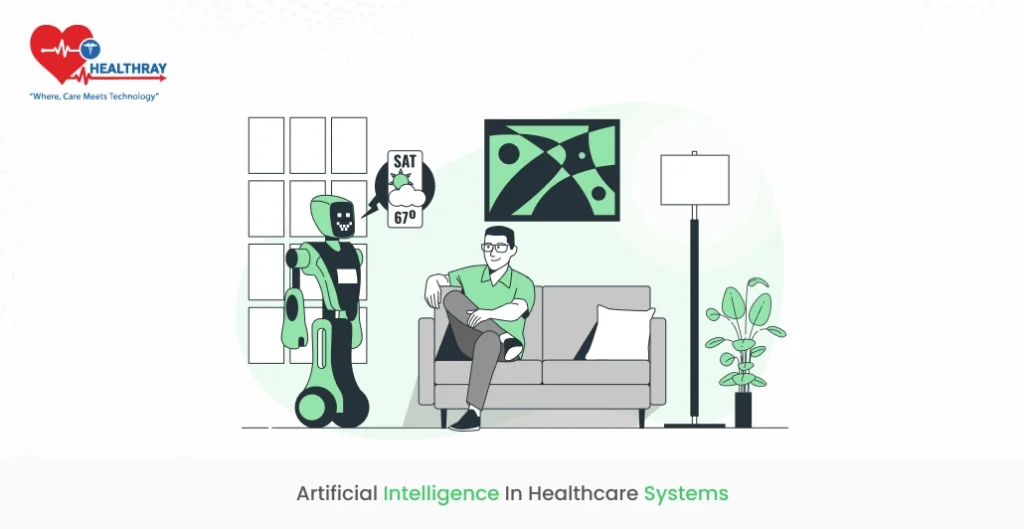
Hospital management systems are a top-tier solution for all hospital challenges. Entire hospital operations are effectively managed from administrative tasks to ward management systems. Easy in diagnosis and interpretation of medical reports. The healthcare industry experienced tremendous effects after implementing hospital management software, enhancing patient contentment and improving revenue cycle management. Maintaining patient data with their demographic information. Also, helps with accurate prescriptions.
Customizable features simplify the prescription process and ensure adherence to hospital regulations. This supports adapting to changing hospital needs and each specialist’s requirements. Therefore, aids in closely aligning with the healthcare objectives. Optimization of operational work tasks which includes scheduling appointments, stock and equipment management, and maintaining whole medical data management. Consequently, improves patient care and supports the streamlining of clinical workflows.
AI Applications in Hospital Management Systems
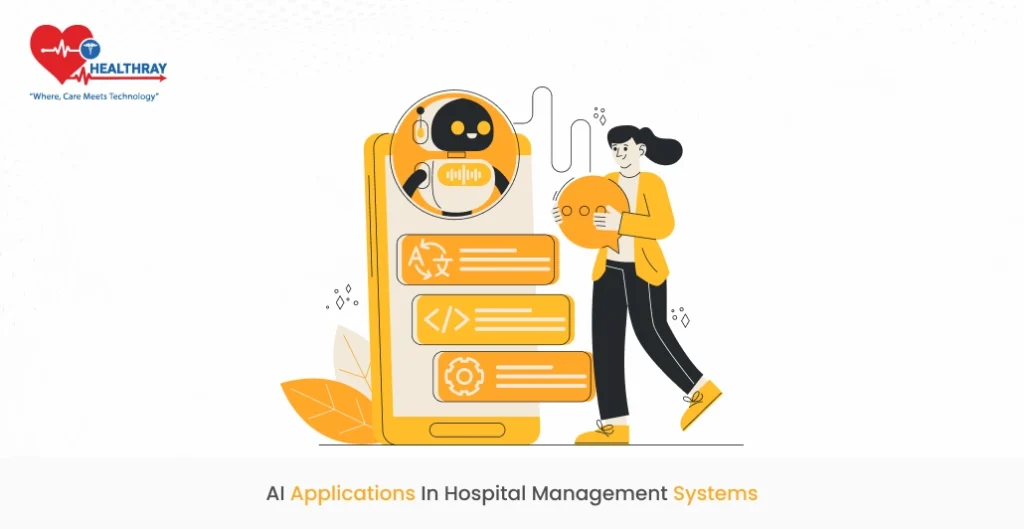
Hospital management software is more popular in the medical industry due to its versatile functionalities which can’t be predicted with the traditional healthcare ecosystem. Supports effective medical practice and enhances hospital efficacy by incorporating machine learning algorithms. Simplifying large hospital data sets which is only possible by AI systems. Let’s discuss the advantages of Artificial Intelligence and understand its impact on the healthcare industry :
Advanced Diagnostic :
Artificial Intelligence has the potential to capture entire medical data comprising patient information with vital signs and demographic information. Moreover, Recording medical history to understand the patient’s past incidents results in effective treatment outcomes and simplifies the prescription procedure. Whole healthcare data in a comprehensive format would be organized in an effective manner that supports easy navigation and finding information when needed. AI tools depict healthcare reports in the dashboard, which makes it easy to interpret and examine medical reports. Therefore, supports early detection of chronic disease and takes proactive decisions for creating a healthier lifestyle. To know more about its tremendous advantages, check the below description :
Simplifying Clinical Tasks :
Hospital Management Systems has the power to transform paper-based documents into digital documents. This reduces manual errors and duplication of efforts and organizes data in a well-defined manner. Moreover, it increases job satisfaction and reduces the retrenchment rate. Eradicating the situation of data mismanagement and operational expenses. Also, reducing healthcare workload and facile insurance claim verification. It leads to focus more on patient satisfaction and derives different strategies for accomplishing the hospital’s goals.
Effective Clinical Decision Making :
Artificial Intelligence in the healthcare industry aids in simplifying complex healthcare data and organizing it systematically. Facilitating accurate medical reports with visual elements leads to effective healthcare decisions. Generally, clinical decisions require a combination of different skills such as a practical approach, in-depth understanding, and need to have an open mindset for sharing medical reports. All these skills are incorporated into practice management software. Consequently, saves specialists time and enhances operational efficiency.
- Patient care
- Scalability
- Inter-departmental collaboration
- Simplifying complex data
- Evident proof data
Healthcare Forecasting :
Hospital Management Software can depict precise reports concisely, to forecast patient conditions and detect chronic disease. Not only predicts health but also supports in predicting the medical equipment life and replacement time. Ease in forecasting inventory and maintain optimal stock level. Hospital management systems systematically organize data and adhere to medical regulations, leading to effective reporting on a single screen. Consequently, predicting the requirement of hospital equipment and medical staff. Also, helps in eliminating the situation of over and under-staffing.
Tele-Monitoring :
Artificial intelligence provides comfort to the healthcare professional, medical staff, and patients as it automates the entire hospital system by incorporating booking appointments, and maintaining patient data with billing information and virtual consultation. Consequently, medical professionals treat patients from remote locations and can persist monitoring of required diseases. Hospital management systems support expanding medical services and enhancing facilities across the region to create a healthier environment.
AI-Driven Automation for Electronic Medical Records documentation
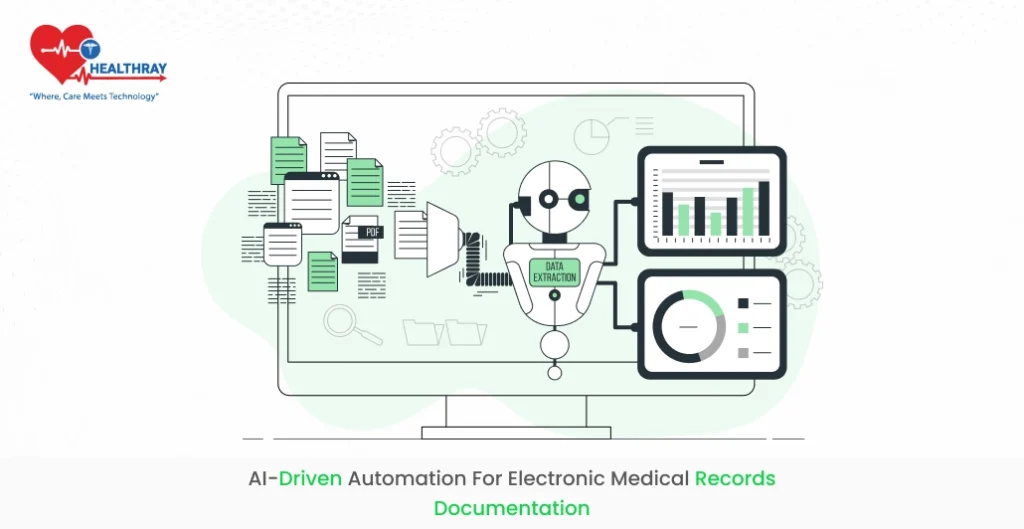
Artificial Intelligence allows electronic medical recording of patient history and ensures data security with compliance with entire medical regulations. Electronic Medical Records have vast capabilities which are difficult to implement in traditional healthcare systems. Whole medical facilities at single platforms from managing appointments to coordination with different healthcare departments and systems. Electronic Medical records have numerous benefits, here are a few of them :
Centralizing Patient Information :
Electronic Health Records maintains clinical data information including patient data with their historical medical information and vital signs. Each patient’s medical information is stored in a ledger format that can be fetched by medical staff and healthcare professionals at any time from a remote location. There are vast amounts of outstanding payments but it’s impossible to take follow up due to the lack of patient information. Consequently, the hospital information system maintains a steady cash flow and simplifies the patient registration process. Also, supports accurate diagnosis and the formulation of better treatment plans.
Maintains Data security :
Digital healthcare solutions maintain data security by implementing technological practices and help in securely collaborating with diverse healthcare departments. easy to share medical information and reports with any healthcare specialists and other medical departments. This is a considerable point when selecting the best Hospital Management Software in Healthcare. This supports data integrity by several practices such as transforming data into the coding format while conducting any financial transaction and sharing information with other healthcare specialists.
- Data encryption.
- Securely sharing.
- Document confidentiality.
- Compliance with healthcare regulations.
- Timely audits
Minimize Hospital Costs :
Hospital Management systems serve as a medical collaboration tool in which different healthcare providers share information and collaborate to expand their hospital services, leading to setting up digital hospital shops without incurring additional investment. Automation of healthcare facilities reduces staff workload and simplifies clinical tasks with speedy insurance verification and reimbursement processes. It reduces the retrenchment rate and minimizes error. Therefore, minimizing recruitment expenses and optimizing healthcare day-to-day operations.
Step towards digital era with our healthcare solution
Revamp your hospital facilities and embrace change for better healthcare management. Ease in managing and organizing large medical datasets leads to effective analysis. Seize the opportunity now!
Resource Sharing :
The Hospital Management System has advanced functionalities, namely capturing data and radiology images. It incorporates a collaboration tool that helps in sharing medical data with other healthcare specialists or medical departments. Also, being able to share medical financial transactions with the accountancy department Consequently, enhances individual patients’ experience and enables them to make proactive decisions. Maintains data integrity while sharing medical reports or any financial transaction. Healthcare providers share their medical knowledge which turns to simplifying complex healthcare processes. Therefore, enhances patient participation and strengthens bonds with medical experts.
Simplifying Healthcare data with automation systems.
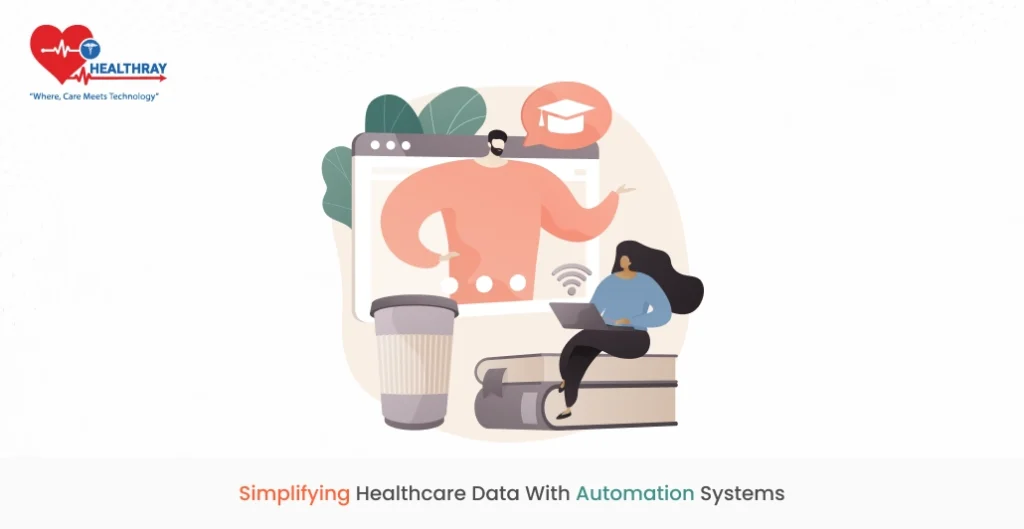
Healthcare software has different attributes that support simplifying medical data and its documentation process. Supports in eliminating paper record documentation and transforming the hospital financial transaction. Furthermore, Numerous medical data collection includes entire patient information with vital signs and symptoms. Recording of patient medical history and hospital history regarding previous patient records, healthcare staff information, and equipment details. Consequently, it supports comparing the healthcare systems and persistent monitoring of progression results after implementing hospital management software.
Incorporates a patient portal which includes patient registration, advance fee details, and demographic information with identity information. Moreover, recording various data such as radiology images, laboratory information, and inventory information with vendor details. Depicting whole health-related data in a single platform. Therefore, supports enhancing patient engagement by increasing their level of satisfaction and assisting them in making proactive decisions towards and maintaining a healthy ecosystem.Simplifying large data in such a manner that would be easy to analyze. Consequently, leads to better decision-making and ensures the credibility of medical personnel.
Conclusion
Artificial intelligence has the vast capability to evolve the healthcare system. Aids in recording whole medical information such as patient medical information with historical medical records, medical financial transactions with vendor details, and capturing radiology images. Moreover, maintains data integrity through encryption, and regular auditing. Also, supports compliance with each healthcare regulation. Electronic Medical Records comprehensively centralize medical information and depicting visual elements, leading to ease in data analysis. Thus, enhancing hospital efficacy and cutting unnecessary hospital expenses.
